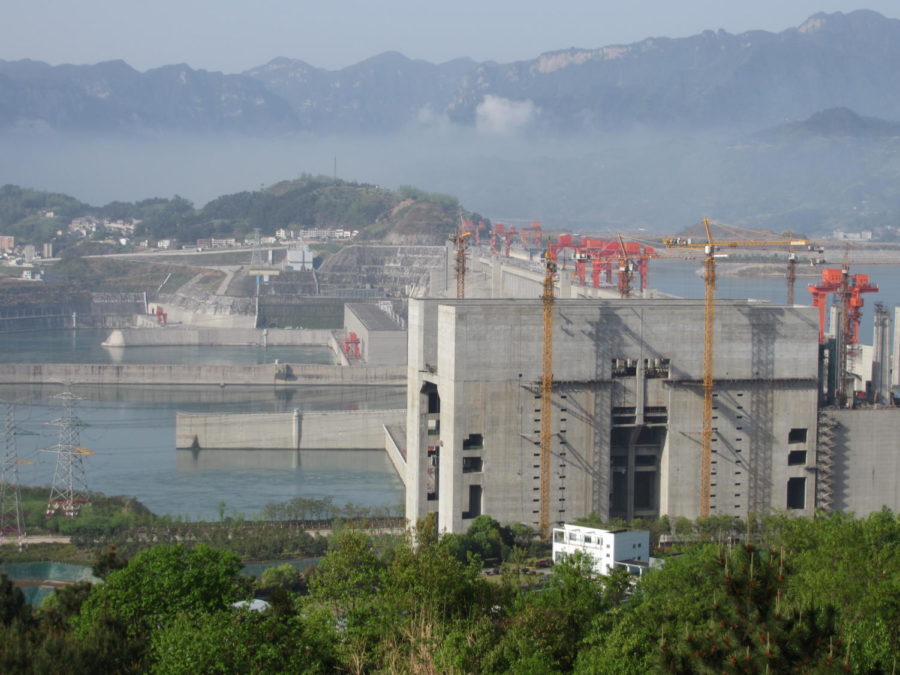Severe Drought Hits China
An eleven week heatwave creates an alarming drought in central, eastern and southwestern China, impairing harvests and hydropower productivity.
Gaynor, CC BY 2.0
The Three Gorges Dam spans along the Yangtze River, serving as a major hydroelectric source. The recent drought has limited its water flow, decreasing its productivity in providing electricity to provinces that rely upon it.
The season of extremes has hit the country of China. As of the beginning of this past summer, China has been experiencing a severe drought, causing a threat to and uncertainty for its many citizens. Multiple provinces have recorded the most extensive periods of high temperatures since records began more than 60 years ago. The central, eastern, and southwestern provinces of China, such as Anhui, Jiangxi, Hubei, Chongqing, Hunan, and Sichuan have been experiencing droughts increasingly. This occurrence challenges the Chinese government’s ability to react effectively and efficiently.
China’s National Meteorological Center gave out an orange alert, a second-severe drought warning for many areas in South China. The alert implies that more than 40% of a province’s crops suffered from drought, or it is expected that the drought index will continue to become more severe within the next week. Anhui, Zhejiang, and Fujian endured excessive drought as a result of some locations reaching temperatures of over 40 degrees Celsius (104 degrees Fahrenheit).
Located in Eastern China, the Yangtze River, a crucial water source for hydroelectric power, daily usage of water, and irrigation, is drying up due to the lack of rain. The Three Gorges Dam, relying on the water flow of the Yangtze River, had a drastic decrease in electricity production. The autumn harvest has been challenged by the heatwave and lack of water. Fortunately, a wave of cold air has been moving over central and eastern China, which has helped to reduce some of the damage.
Darkest Harvest
Pivotal agricultural regions have been warned of the influence of the drought and heatwave on crops. According to statistics released by the Ministry of Water Resources of The People’s Republic of China in September 2022, it specified that more than 1.99 million hectares of arable land have been affected by the drought. In the province of Anhui, farmers have also observed the same effects.
Anhui is located near the basin of the Yangtze River and heavily relies on its water for irrigation. Farmers are facing numerous issues due to a lack of water and rising temperatures. One family in Anhui has already experienced the uttermost hit to their harvest.
“The crops that my family [in the province of Anhui] planted before can be harvested to about 4,000 pounds, each plump. This year, it is only about 300 pounds, mostly all flat. The capital was not recovered either, and we had to give in our own dimes,” the daughter of the family (who wishes to remain anonymous) told me in a text-to-text interview.
This year’s harvest was deleterious to their family income because the amount of profit earned was much lower than they had anticipated compared to previous years. Luckily, on Wednesday, August 24th 2022, the State Council of the People’s Republic of China announced a 10 billion yuan ($1.45 billion) subsidy to support rice farmers experiencing drought conditions, along with central governmental facilitation and regional government’s implementation to tackle the economic hardships. Though the family in Anhui does not grow rice, this news is relieving for rice farmers in China.
Not only was the Anhui family suffering from income loss, but also their daily lives were influenced negatively as well. The daughter explains that “We can’t even eat the vegetables grown at home, as they are too dry, and we can’t water them. The fish ponds are all dry, the fish are scooped up, and they have died from a lack of oxygen.” The rise of temperatures resulted in increased water demands for both agricultural irrigation and challenged the survival of animals and livestock.
In fact, artificial precipitation was also used by local governments in Jiangxi, Anhui, and Hubei to ease the drought’s effects. A 65 million yuan ($9.5 million) emergency financial subsidy was allocated to Guizhou Province in Southwest China to assuage the drought through artificial precipitation. Artificial precipitation refers to cloud seeding, where chemicals are dispersed inside clouds that act as a catalyst to produce more rain.
Withering Yangtze River and Power Crunch
The effects of the Yangtze River drying were most prominent in the province of Sichuan, which greatly relies on hydroelectric power (80%) produced by the Three Gorges Dam. Before the drought, Sichuan would have a surplus of power that it sent to Shanghai and other cities.
However, power generation in Sichuan was cut down to half the normal level after the massive decline in water levels and flows. Now, more frequent periodic power outages in the city of Sichuan can be seen. This decrease in available power leads to a power crunch, restraining China’s plan to grow its industrial output.
The province of Chongqing, located near Sichuan, hit a soaring temperature of 45 degrees Celsius (113 degrees Fahrenheit) during the week of August 14th, 2022. As it gradually exceeds the average temperature of around 24.4 degrees Celsius, it is devastating for the residents, as it can trigger hazardous conditions for the human body. Exposure to intense heat for an extended period causes heat strokes, heat cramps, headaches, dizziness, dehydration, and hyperthermia. To ease power demand, Chongqing announced that opening hours at more than 500 malls and other commercial establishments would be shortened starting the following Monday, August 29th, 2022. Some factories were ordered to shut down or limit production to save power. Among those are Toyota Motor Corporation and CATL, a battery manufacturer.

Chengdu, the capital city of Sichuan, is home to about 21 million people. The rail system in the city began running on “power-saving” mode on Wednesday, August 17th, 2022, turning on low-power lights and controlling temperatures in stations and train compartments. Some traffic lights in areas with fewer cars have been turned off, and the use of air conditioners has been restricted, as well. This causes many citizens to search for other ways to relieve the heat, such as sleeping in apartment garages and staying or playing near rivers with cooler temperatures. The once most lit up and famous place in the city, Chunxi Road, a pedestrian shopping street, became completely dark, after orders were sent to save power. The street no longer kept its chaotic, yet flourishing identity.
Global Warming
The drought severely impacted the President of the People’s Republic of China, Xi Jinping’s goal of maximizing China’s industrial output. This drought increased uncertainty and unreliability attached to hydroelectric power and any renewable energy, leading to an increase in the use of coal in China, a factor that further contributes to the heating of the planet. China, the second largest economy in the world, came to a realization that coal might be the only energy source that would be “safe” to use and run the country without any disturbances. New plans must be prioritized in order to slow global warming, which is one of the most credible causes of drought and heat waves in the first place.
“The crops that my family [in the province of Anhui] planted before can be harvested to about 4,000 pounds, each plump. This year, it is only about 300 pounds, mostly all flat. The capital was not recovered either, and we had to give in our own dimes,” the daughter of the family (who wishes to remain anonymous) told me in a text-to-text interview.
Ella Zheng is a Managing and Advisory Manager and Instagram Editor for ‘The Science Survey.’ She finds passion in writing stories that inform, educate,...











